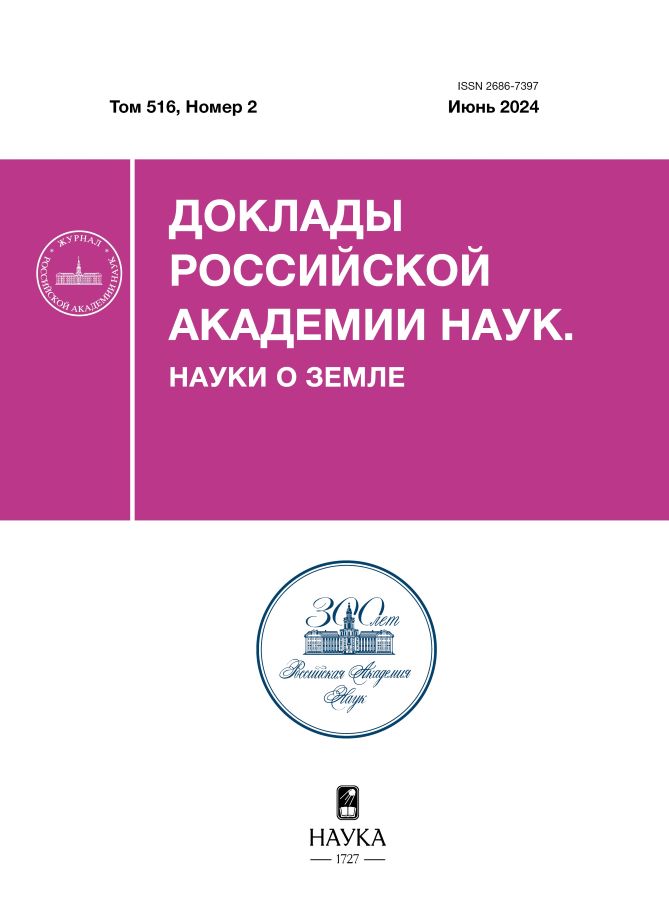Permafrost boundary change in the Bolshezemelskaya tundra under different scenarios of climate change in the XXI century
- Autores: Alexandrov G.A.1, Ginzburg A.S.1, Gytarsky M.L.2, Chernokulsky A.V.1,3, Semenov V.A.1,3
-
Afiliações:
- A.M. Obukhov Institute of Atmospheric Physics, Russian Academy of Sciences
- Russian Energy Agency
- Institute of Geography, Russian Academy of Sciences
- Edição: Volume 516, Nº 2 (2024)
- Páginas: 649-654
- Seção: CLIMATIC PROCESSES
- ##submission.dateSubmitted##: 31.01.2025
- ##submission.datePublished##: 12.12.2024
- URL: https://edgccjournal.org/2686-7397/article/view/650054
- DOI: https://doi.org/10.31857/S2686739724060184
- ID: 650054
Citar
Texto integral
Resumo
Prognostic estimates of changes in the climatological boundary of the permafrost zone as a function of the average annual air temperature on the territory of the Bolshezemelskaya tundra under various scenarios of the development of the world economy until the middle of the XXI century have been obtained. It is shown that the shift of the climatological boundary of permafrost, determined by the threshold value of the average annual air temperature, in the north-eastern direction observed in the period from 1950 to 2010, according to the adjusted scenario forecasts, obtained using a climate model, will continue in the coming decades under any scenario of the development of the world economy and is an inevitable consequence of anthropogenic influence on the climate. The results of the study are important for assessing the prospects and development of a network of long-term observations, which is being created to monitor the state of permafrost and greenhouse gas fluxes in the Russian Federation.
Palavras-chave
Texto integral
Sobre autores
G. Alexandrov
A.M. Obukhov Institute of Atmospheric Physics, Russian Academy of Sciences
Autor responsável pela correspondência
Email: g.alexandrov@ifaran.ru
Rússia, Moscow
A. Ginzburg
A.M. Obukhov Institute of Atmospheric Physics, Russian Academy of Sciences
Email: g.alexandrov@ifaran.ru
Rússia, Moscow
M. Gytarsky
Russian Energy Agency
Email: g.alexandrov@ifaran.ru
Rússia, Moscow
A. Chernokulsky
A.M. Obukhov Institute of Atmospheric Physics, Russian Academy of Sciences; Institute of Geography, Russian Academy of Sciences
Email: g.alexandrov@ifaran.ru
Rússia, Moscow; Moscow
V. Semenov
A.M. Obukhov Institute of Atmospheric Physics, Russian Academy of Sciences; Institute of Geography, Russian Academy of Sciences
Email: g.alexandrov@ifaran.ru
Academician of the RAS
Rússia, Moscow; MoscowBibliografia
- Васильев А. А., Гравис А. Г., Губарьков А. А. и др. Деградация мерзлоты: результаты многолетнего геокриологического мониторинга в западном секторе российской Арктики // Криосфера Земли. 2020. Т. 24, № 2. С. 15–30.
- Canadell J. G., Monteiro P. M. S., Costa M. H. L. et al. Global Carbon and other Biogeochemical Cycles and Feedbacks // Climate Change 2021: The Physical Science Basis. Cambridge: Cambridge University Press, 2021. P. 673–816 https://doi.org/10.1017/9781009157896.007
- Anisimov O., Nelson F. Application of mathematical models to investigate the interaction between the climate and permafrost // Soviet Meteorology and Hydrology. 1990. № 10. P. 8–13.
- Демченко П. Ф., Величко А. А., Елисеев А. В. и др. Зависимость условий распространения вечной мерзлоты от уровня глобального потепления: сравнение моделей, сценариев и данных палереконструкций // Известия РАН. Физика атмосферы и океана. 2002. Т. 38. № 2. С. 165–174.
- Peng X., Zhang T., Frauenfeld O.W. et al. Soil freeze depth variability across Eurasia during 1850–2100 // Climatic Change. 2020. V. 158. № 3–4. P. 531–549.
- Smith M. W., Riseborough D. W. Climate and the limits of permafrost: a zonal analysis // Permafrost Periglac. Process. 2002. V. 13. № 1. P. 1–15.
- Chadburn S. E., Burke E. J., Cox P. M. et al. An observation-based constraint on permafrost loss as a function of global warming // Nature Climate Change. 2017. V. 7. № 5. P. 340–344.
- Гаврилова М. К. Современный климат и вечная мерзлота. Новосибирск: Наука, 1981. 121 с.
- Alexandrov G.A., Ginzburg V.A., Insarov G.E., Romanovskaya A.A. CMIP6 model projections leave no room for permafrost to persist in Western Siberia under the SSP5-8.5 scenario // Climatic Change. 2021. V. 169. № 3–4. P. 42.
- Кислов А. В. Климатология. М.: Академия, 2011. 224 c.
- Мельников В. П., Осипов В. И., Брушков А. В. и др. Развитие геокриологического мониторинга природных и технических объектов в криолитозоне Российской Федерации на основе систем геотехнического мониторинга топливно-энергетического комплекса // Криосфера Земли. 2022. Т. 26. № 4. С. 3–18.
- Брушков А. В., Дроздов Д. С., Дубровин В. А. и др. Структура и параметры геокриологического мониторинга // Научный вестник Арктики. 2022. № 12. С. 78–88.
- ФЗ №297 от 10.07.2023 // Российская газета. 2023, 12 июл. № 9096(8). URL: https://rg.ru/documents/ 2023/07/12/document-1689088543383187.html
- WMO. Global Greenhouse Gas Watch Programme. URL: https://wmo.int/activities/global-greenhouse-gas-watch/global-greenhouse-gas-watch-programme
- Swart N. C., Cole J. N., Kharin V. V. et al. The Canadian Earth System Model version 5 (CanESM5. 0.3) // Geoscientific Model Development. Copernicus GmbH, 2019. V. 12. № 11. P. 4823–4873.
- Compo G. P., Whitaker J. S., Sardeshmukh P. D. et al. The Twentieth Century Reanalysis Project: The Twentieth Century Reanalysis Project // Q. J. R. Meteorol. Soc. 2011. V. 137. № 654. P. 1–28.
- O’Neill B. C., Kriegler E., Riahi K. et al. A new scenario framework for climate change research: the concept of shared socioeconomic pathways // Climatic Change. 2014. V. 122. № 3. P. 387–400.
- Shirokova L., Ivanova I., Manasypov R. et al. The evolution of the ecosystems of thermokarst lakes of the Bolshezemelskaya tundra in the context of climate change // E3S Web of Conferences. 2019. V. 98. P. 02010. https://doi.org/10.1051/e3sconf/20199802010
- Каверин Д. А., Пастухов А. В., Новаковский А. Б. Особенности современного температурного режима почвогрунтов на участке пересечения бугристого торфяника автодорогой на юге Большеземельской тундры // Криосфера Земли. 2020. Т. 24. № 1. С. 23–33.
- Rodenhizer H., Belshe F., Celis G. et al. Abrupt permafrost thaw accelerates carbon dioxide and methane release at a tussock tundra site // Arctic, Antarctic and Alpine Research. 2022. V. 54. № 1. P. 443–464.
Arquivos suplementares












